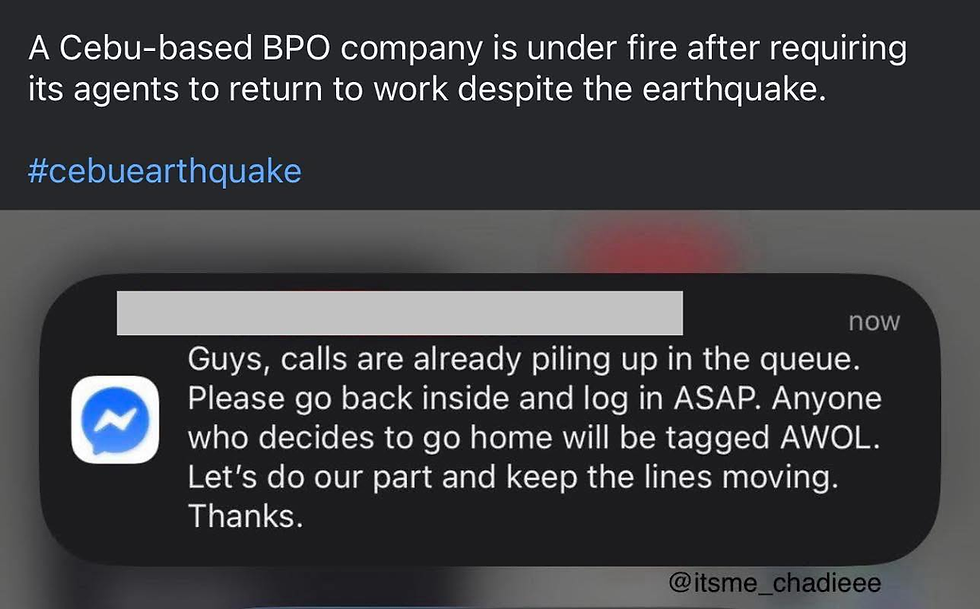How HR Can Truly Make a Difference in Workplace Safety: A Personal Reflection from the Cebu Earthquake
- Joy Alosbaños
- Oct 3, 2025
- 3 min read
Updated: Nov 20, 2025

The 6.9 earthquake that shook Cebu recently revealed just how fragile workplace safety can be when it's not given the attention it deserves. Several BPOs pushed their teams to keep working even as aftershocks rattled the buildings and concerns for structural safety mounted. This experience was a wake-up call for all of us, especially those of us in HR roles.
Why HR Matters More Than Ever in Safety
HR isn’t just about hiring and payroll—it’s about people. It’s about making sure everyone goes home safe at the end of the day. When an earthquake or other disasters strike, the role of HR becomes even clearer: protect, lead, communicate, and care.
What I’ve Learned Through Experience
I want to share something personal. Even though I don’t have an official Safety Officer 2 (SO2) accreditation from DOLE, when the earthquake hit, I didn’t hesitate to step up. I made sure every employee was evacuated safely. I took charge of headcounts and coordinated with the building administration to stay updated on structural safety during the work stoppage.
Every year, I’ve been involved in organizing workplace safety seminars covering everything from earthquakes and other disasters to COVID-19 protocols. These aren’t just check-the-box training—they’re about preparing people for real situations. And when the real thing hit, having prepared the team made a difference.
Throughout that tense time, I kept management informed with real-time updates and kept reminding everyone that safety comes first—even if it meant suspending work.
Managing Safety During Other Disasters
When employees are right in the middle of a typhoon while working, HR has the duty to ensure their safety by not allowing them to go home until it is safe to travel. Similarly, during flooding, HR may require employees to stay put in the office until conditions improve, prioritizing protection over convenience.
Understanding Employee Concerns
I cannot blame employees for filing complaints when their safety has been compromised. If anything, it’s understandable. Some companies even blocked exits, insisting employees remain at their desks to attend to their jobs despite clear hazards. This “I don’t care” mentality toward worker safety only deepens distrust and fear. Employees have every right to raise their voices when basic safety is ignored.
The Legal Framework Supports Us
We’re not flying blind here. Philippine laws like Republic Act 11058 and DOLE’s Department Order No. 252-25 back us up, giving workers the right to refuse unsafe work and requiring employers to maintain hazard-free spaces. That means as HR professionals, it’s our responsibility—and our power—to enforce these rules and protect our people.
Building a Culture of Care
Safety is a mindset, not just a procedure. HR must be the champion of that mindset, promoting open communication, ongoing training, and a real sense of care. The Cebu earthquake is a stark reminder that business goals must never override human life.
At the end of the day, HR is about humanity. And there’s no greater responsibility than making sure everyone is safe, heard, and valued. PEOPLE FIRST BAGO NEGOSYO (crediting this to Doc. Dong Binghay of UP SOLAIR).
Reference:
About Me:
Joseline M. Alosbaños, known as the HR Carousel Ringmistress, is a Philippine-based Certified HR Practitioner with over twenty years of experience in Human Resources Management. Her extensive career spans various sectors, including corporate, freelancing, and consulting, equipping her with a wide range of skills. Joseline excels in employee relations, talent acquisition, total rewards management, HR operations, and organizational development, successfully implementing HR strategies that align with business objectives and promote a positive workplace atmosphere. If you require my services, feel free to contact me at joyce.alosbanos@gmail.com.






Comments